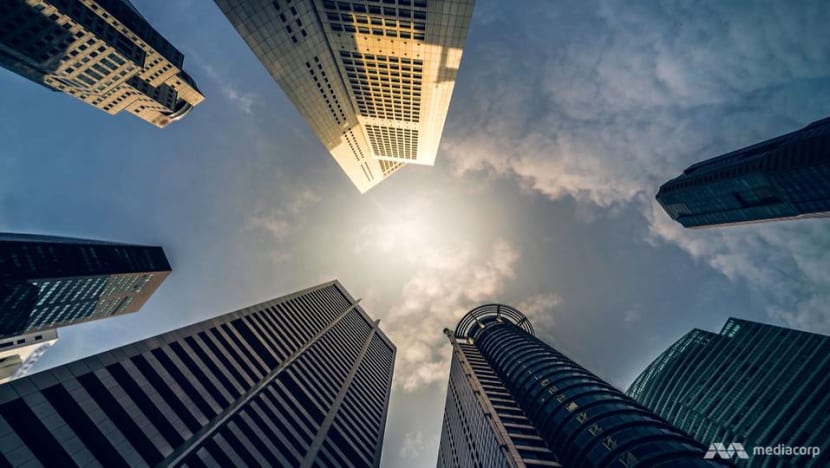In charting energy transition, Singapore 'mindful' of impact on electricity cost: Tan See Leng
“I would like to assure households and businesses that we will do our utmost best to calibrate the trajectory of our energy transition and its impact on electricity tariffs,” says Second Minister for Trade and Industry Tan See Leng.

Singapore has invested significant resources into clean energy.

This audio is generated by an AI tool.
SINGAPORE: The government will take “great care” in charting Singapore’s energy transition to ensure that it remains cost-competitive, said Second Minister for Trade and Industry Tan See Leng on Friday (Mar 1).
“In particular, we are mindful of the potential impact of energy transition on electricity prices,” he told the House during a debate on the ministry’s spending plans for the year.
“I would like to assure households and businesses that we will do our utmost best to calibrate the trajectory of our energy transition and its impact on electricity tariffs.”
These will include continued support for lower- and middle-income households on electricity bills, as well as assistance for businesses to improve their energy efficiency.
Dr Tan, who is also Manpower Minister, spoke about Singapore’s plans to transition and decarbonise its industries and overall economy – a move that is essential to keep the country relevant amid a global net-zero shift and despite its lack of indigenous renewable energy resources.
Ongoing efforts include the search for cleaner power supplies and studies on the potential of various low-carbon energy sources such as hydrogen and geothermal.
On the former, Singapore has previously announced a target to import up to four gigawatts of low-carbon electricity by 2035, which will make up about 30 per cent of Singapore's electricity supply that year. Dr Tan said Singapore is “on track” to achieve that target.
But to decarbonise, clean energy will have to be deployed “at scale”. Such nascent technologies may involve “significant commercial and geopolitical risks or require high upfront capital expenditures”.
“All these would require substantial investment from governments and companies alike,” said Dr Tan.
This is why a new Future Energy Fund was announced in Budget 2024 to support the infrastructure investments needed to deploy low-carbon technologies when they are viable, he added.
The new fund will have an initial injection of S$5 billion (US$3.7 billion). Top-ups to the fund will be done “when our fiscal space allows for it and depending on (Singapore’s) development plans for the energy transition”, Dr Tan said.
NEW INITIATIVES TO DEVELOP GREEN TECHNOLOGIES
Another new initiative involves the development of carbon capture and storage (CCS), which is seen as playing a key role in decarbonising industrial processes here.
The new technology involves the capture of emissions from point sources, such as chemical plants or power plants. Carbon dioxide is then transported to suitable geological formations where they are injected and stored deep underground.
To that end, Dr Tan announced that the government will be partnering S-Hub – an industry consortium comprising ExxonMobil and Shell – to study the viability of developing a cross-border CCS project capturing emissions from Singapore.
“The government will work with S-Hub to evaluate the techno-economic feasibility of aggregating emissions from Singapore, and collaborate with regional partners to study potential carbon dioxide storage sites,” he said.
In a separate press release, the S-Hub consortium said it signed a memorandum of understanding with the Economic Development Board last December to plan and develop a CCS project “capable of capturing and permanently storing at least 2.5 million tons of carbon dioxide a year by 2030”.
These storage sites – to be located deep underground or under the seabed – will be selected after undergoing "rigorous analysis" to ensure their suitability.
“Commitment to proceed will be subject to definitive agreements between the parties,” the consortium said.
Moving forward, Dr Tan said Singapore is keen to “work with like-minded partners to make cross-border CCS projects a reality and realise the potential of the region as a CCS hub”.
The Climate Conversations - Can Singapore's clean energy transition include nuclear and geothermal sources?
At the same time, more funds will be directed towards research and development of low-carbon alternatives and the development of technological solutions suited for Singapore.
One such effort is the Low Carbon Energy Research programme funded by the National Research Foundation and hosted by the Agency for Science, Technology and Research (A*STAR).
Dr Tan announced that around S$43 million will be awarded to support six research projects under this programme to address challenges that Singapore faces in deploying hydrogen, such as energy efficiency, durability and safety.
WHAT IT MEANS FOR BUSINESSES
The transition to a low-carbon and sustainable economy was also mentioned by Minister of Trade and Industry Gan Kim Yong, who stressed that it presents new growth opportunities for businesses.
For instance, Singapore has established a vibrant carbon services and trading ecosystem to take advantage of the growth in the global carbon market.
There are also opportunities to develop sustainable products, such as biofuels, sustainable aviation fuel and green chemicals, which support our green growth objectives, he added.
Businesses will also have to adapt to a changing world where customers and investors will expect firms to be more transparent about their carbon footprint, said Minister of State Low Yen Ling.
Earlier this week, the Finance Ministry announced that climate-related disclosures will be made mandatory for more businesses in Singapore, starting with listed companies in the financial year of 2025.
The new requirement will also apply to large non-listed companies – defined as having annual revenues of at least S$1 billion and total assets of at least S$500 million – from FY2027.
In line with that, a new Sustainability Reporting Grant will be rolled out to provide large companies with up to 30 per cent of funding support. The new grant will apply to firms with annual revenue of S$100 million and above.
While smaller businesses will not be affected by the new rules, Ms Low said sustainability reporting will help them stay relevant as disclosure of carbon footprint data becomes commonplace.
Hence, EnterpriseSG will partner with appointed sustainability service providers to launch a programme to help small and medium-sized enterprises (SMEs) develop their first sustainability reports.
The programme, targeted to be launched in late 2024, will defray 70 per cent of eligible costs for SMEs participating in the first year of the programme, followed by 50 per cent of costs for the next two years.


















